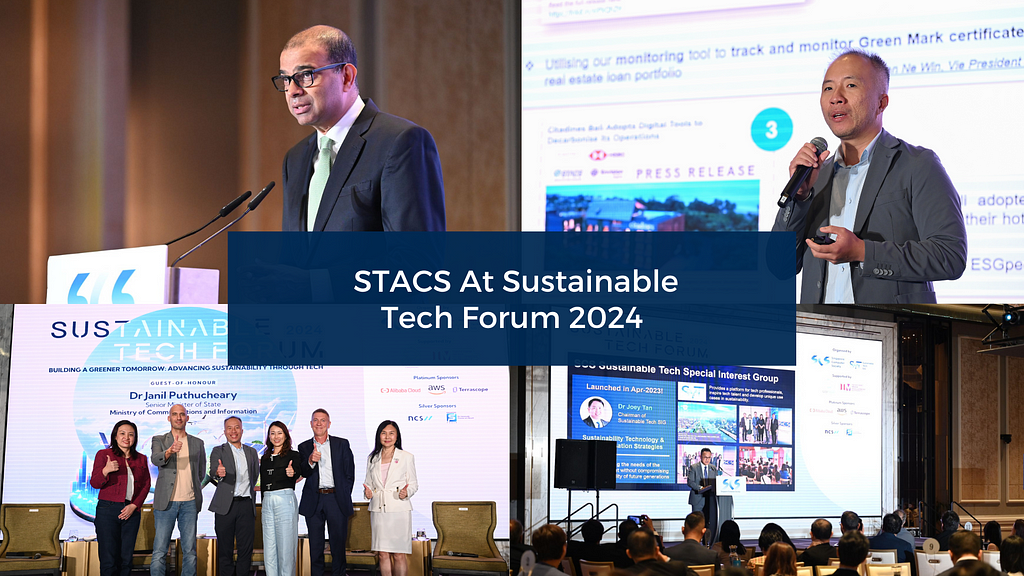The event was positioned as a dynamic and forward-thinking forum that brings together experts, innovators, policymakers, and thought leaders from various fields to explore, discuss, and inspire action towards a more sustainable future.
The goal was to increase awareness of the role of technology in advancing sustainability, create collaboration opportunities among attendees, enable a platform for inspiration and knowledge sharing to drive sustainable tech innovation, and enhance understanding of how individuals and organisations can contribute to a greener future.
Guest of Honour: Dr. Janil Puthucheary, Senior Minister of State for the Ministry of Communications and Information
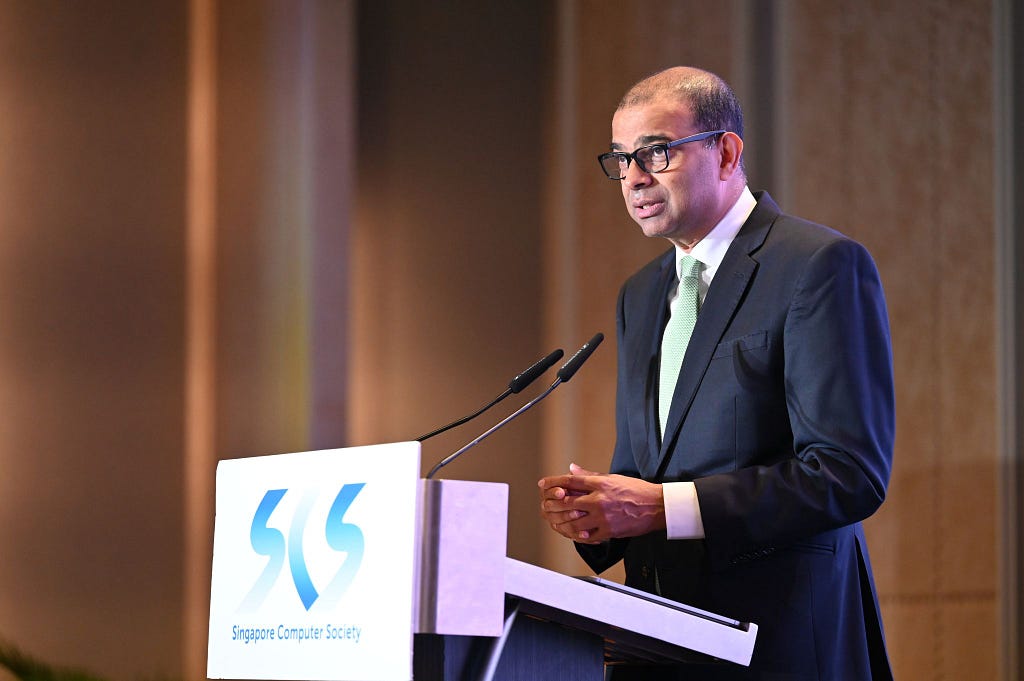
In his opening address, Dr. Janil Puthucheary, the Senior Minister of State for the Ministry of Communications and Information (MCI), highlighted the pivotal role of Information and Communication Technology (ICT) in both contributing to and mitigating carbon emissions.
He acknowledged that while ICT itself is a source of carbon emissions, significant strides are being made to address this.
At the event, the minister announced the launch of the Green Computing Solutions program by the Infocomm Media Development Authority (IMDA), which comes with a substantial investment of S$30 million.
This initiative is designed to foster the development of environmentally-friendly computing technologies.
Additionally, Dr. Puthucheary discussed the introduction of Green Software Trials, which focus on incorporating carbon reduction techniques directly into software development processes.
He also pointed out the efforts of GovTech in establishing centralised government data centres in Green Mark-certified buildings, a move which underlines the government’s commitment to sustainable practices.
The implementation of strict sustainable procurement practices at the government level is key, ensuring that environmental considerations are central to government purchasing decisions.
In the second part of his address, the minister shifted focus to the broader impact of ICT in aiding other industries to manage and reduce their emissions, and noted IMDA has identified nine innovative solutions under its Accelerate Smart Deployment (ADS) Programme.
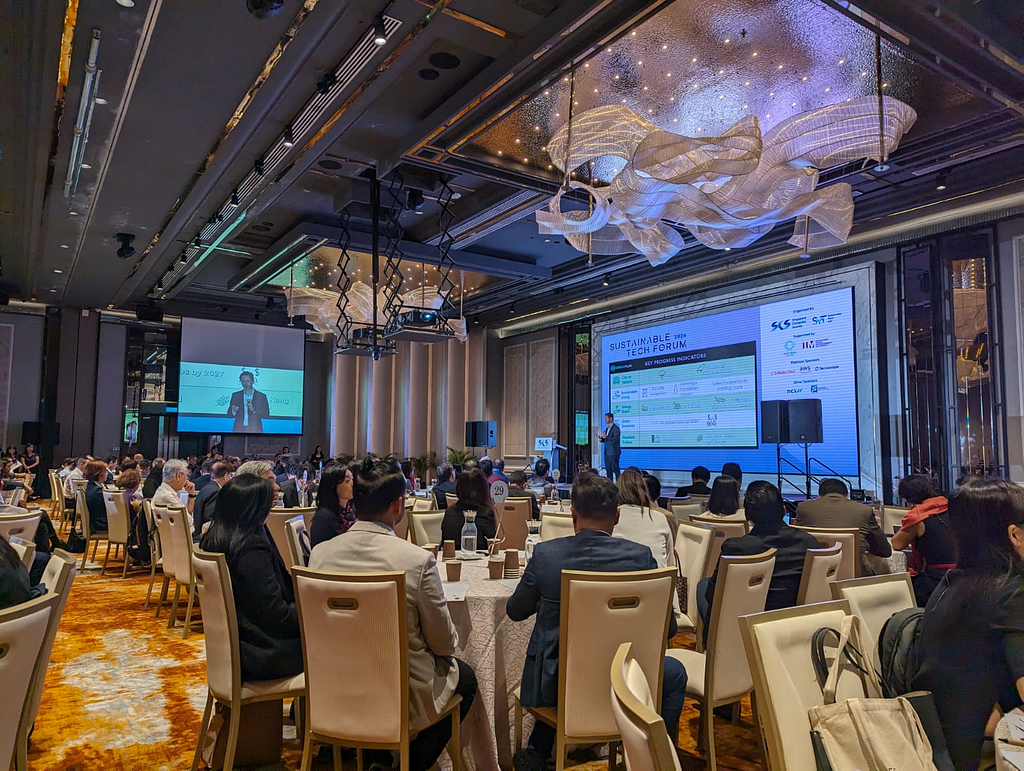
These solutions are essential in qualifying companies for grants and support, exemplified by Call Lade Enterprises, which has benefited significantly from vehicle tracking solutions, underscoring how ICT can be instrumental in enhancing operational efficiency and reducing carbon footprints across various industries.
Finally, Dr. Puthucheary highlighted the role of GovTech’s Open Digital Platform in monitoring and managing the environmental impact of urban developments.
This platform is particularly noteworthy in its application in Punggol City District, where it is being used to track and reduce carbon emissions through predictive analysis of energy demand and supply, showcasing how smart city solutions can be leveraged to create more sustainable urban environments.
Overall, the minister’s opening remarks served to underscore the dual role of ICT in environmental sustainability as both a challenge to be managed and a crucial tool for advancing green initiatives.
Session #1: Doing Well and Doing Good with Sustainability
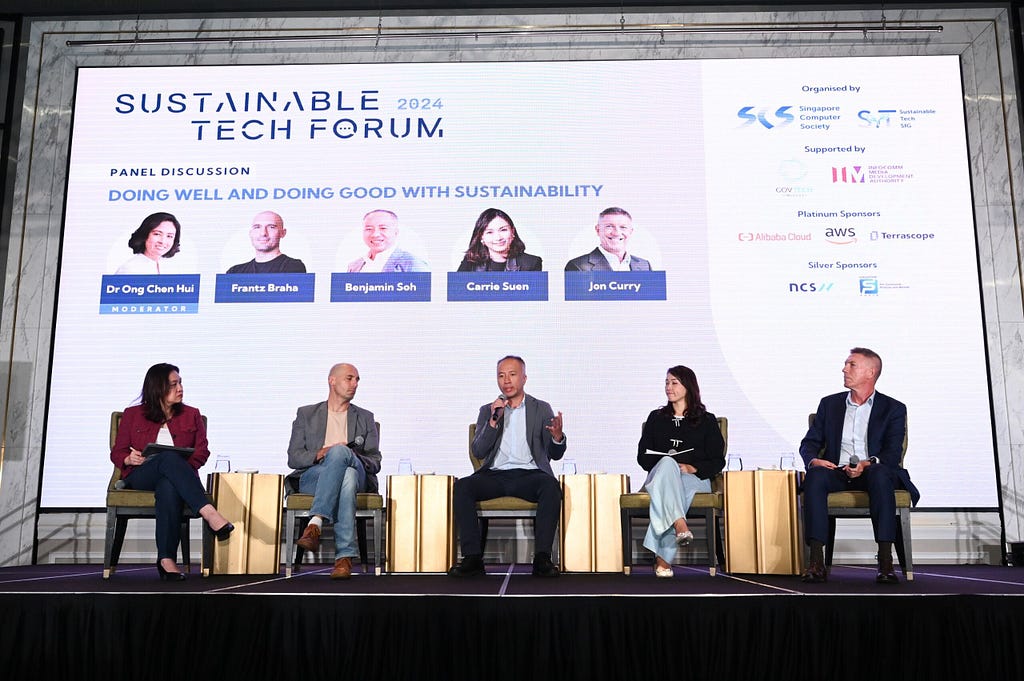
STACS first appearance on stage was on a panel discussion on a very timely and critical theme: “Doing Well and Doing Good with Sustainability”.
The dialogue was an opportunity to delve into how businesses can thrive by incorporating sustainability into their core strategies, creating a positive impact on the environment and society.
Moderated by Dr. Ong Chen Hui, who is part of the ACE, BizTech Group at IMDA, panellists included:
- Benjamin Soh, Managing Director of STACS, will offer his perspective on sustainable practices in the ESG and finance technology sector, and digital solutions to empower sustainability for businesses.
- Jon Curry, Vice President of Operations at Digital Realty, will share his expertise on the sustainability initiatives in the digital infrastructure space.
- Carrie Suen, Senior Advisor of Global Affairs and Sustainability Strategies at Ant Group, will provide insights into global sustainability trends and how they’re being integrated into business strategies.
- Frantz Braha, Chief Growth Officer and Co-owner of SaladStop!, will discuss the role of sustainability in the food industry and how it contributes to the company’s growth.
The panel featured a 45-minute discussion on leveraging data analytics for achieving sustainability goals in businesses, in which Benjamin highlighted STACS’ platform ESGpedia, designed to create comprehensive sustainability profiles for companies, similar to Wikipedia profiles.
He explained the importance of data in enabling companies to become sustainable by making operational data accessible and visualised, while noting that many companies already possess relevant sustainability data in their existing systems (like accounting or HR software) but it’s not always easily accessible.
The goal of our technology platform ESGpedia is to help visualise this data, aiding in meeting regulatory requirements and operational savings by reducing energy costs.
The discussion also touched on the challenges of digitising legacy data points, like water consumption and waste disposal in shared facilities.
Ben educated the audience with the historical context of double-entry accounting, popularised by Genghis Khan (1162–1227), drawing a parallel to the current need for standardising carbon accounting and the crucial role of digitalisation in this process.
In concluding remarks, he highlighted the role of artificial intelligence (AI) in sustainability and its use in aggregating vast data points and providing recommendations.
The importance of partnerships in addressing industry-specific requirements and privacy concerns was also a key theme, with the overall message being one of technology and data analytics helping businesses achieve sustainability goals while also realising operational benefits.
Specifically, ESGpedia has a unique Asian ESG marketplace with strong Asian connections and partnerships, and the benefits of this extend across supply chain procurement, financing, amplification of ESG profiles, and more.
Session #2: Enabling Sustainability in the Built Environment
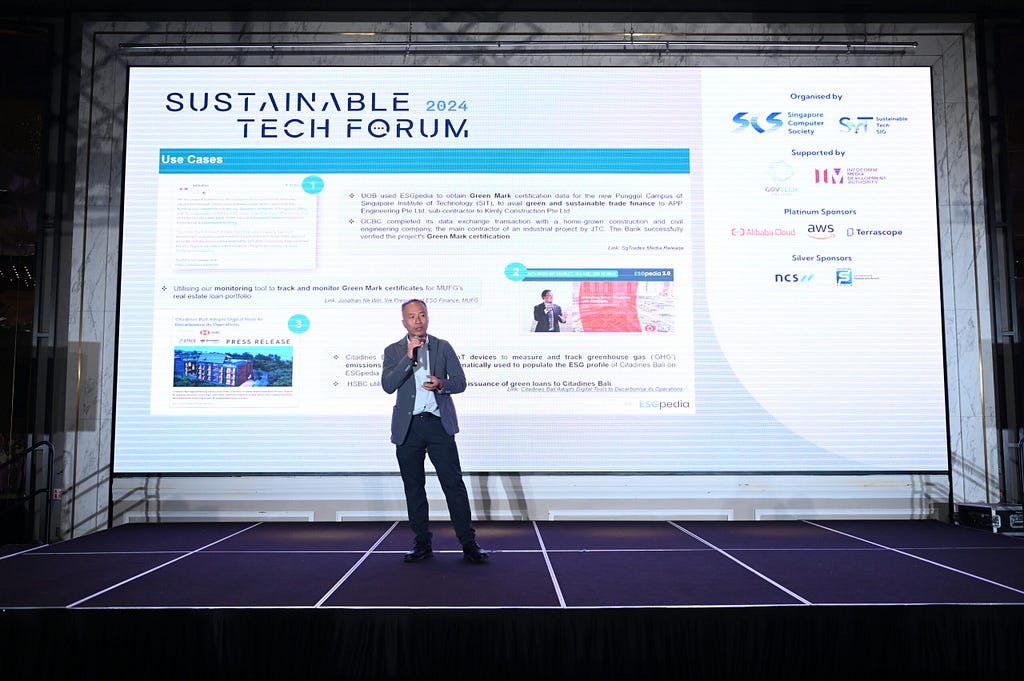
In the second session, Benjamin was joined on stage by Jin Guang Yu of BCA and Lin Wujuan of Hitachi to explore the topic Enabling Sustainability in the Built Environment.
In addition to sharings by BCA and Hitachi in terms of what they are doing within their own businesses, Ben shared the STACS perspective on the application of AI technologies and data analytics in sustainability standards and reporting, particularly in the context of property development and management.
Discover more about sustainable real estate and how it is shaping the future of the built industry.
ESGpedia Intelligence aims to amplify the sustainability efforts of using ESGpedia’s proprietary AI engine to effectively handle ESG data at scale by scanning over 100,000 sustainability reports in the public domain, helping companies and property developers/owners convert rich data into standards usable in commercial terms.
Our platform supports various standards and provides third-party verification of reports, which means it can be used in different Asian countries to convert data into local sustainability formats.
There are over 250,000 certificates in various sectors, with comprehensive data covering certification levels, energy utilisation, and other metrics. Businesses that are new to sustainability, can leverage on our free ESG Starter tool on ESGpedia Nexus to create a profile and calculate their GHG emissions.
Navigating the Path for Sustainability with Businesses in the Built Environment
Local banks like UOB, DBS, and OCBC in Singapore already use ESGpedia’s data for green building financing decisions, while international banks also use it to monitor entire portfolios, assessing the impact of climate change on building performance and investment.
The session aimed to visualise through live partner case studies how building operators can convert operations into green mark applications, achieving certifications, and improving sustainability.
We are grateful for the opportunity to collaborate once again with Singapore Computer Society and welcome more of such meaningful opportunities to share our expertise in ESG technology and sustainability for businesses, as we remain committed to empowering Asia towards sustainability.




